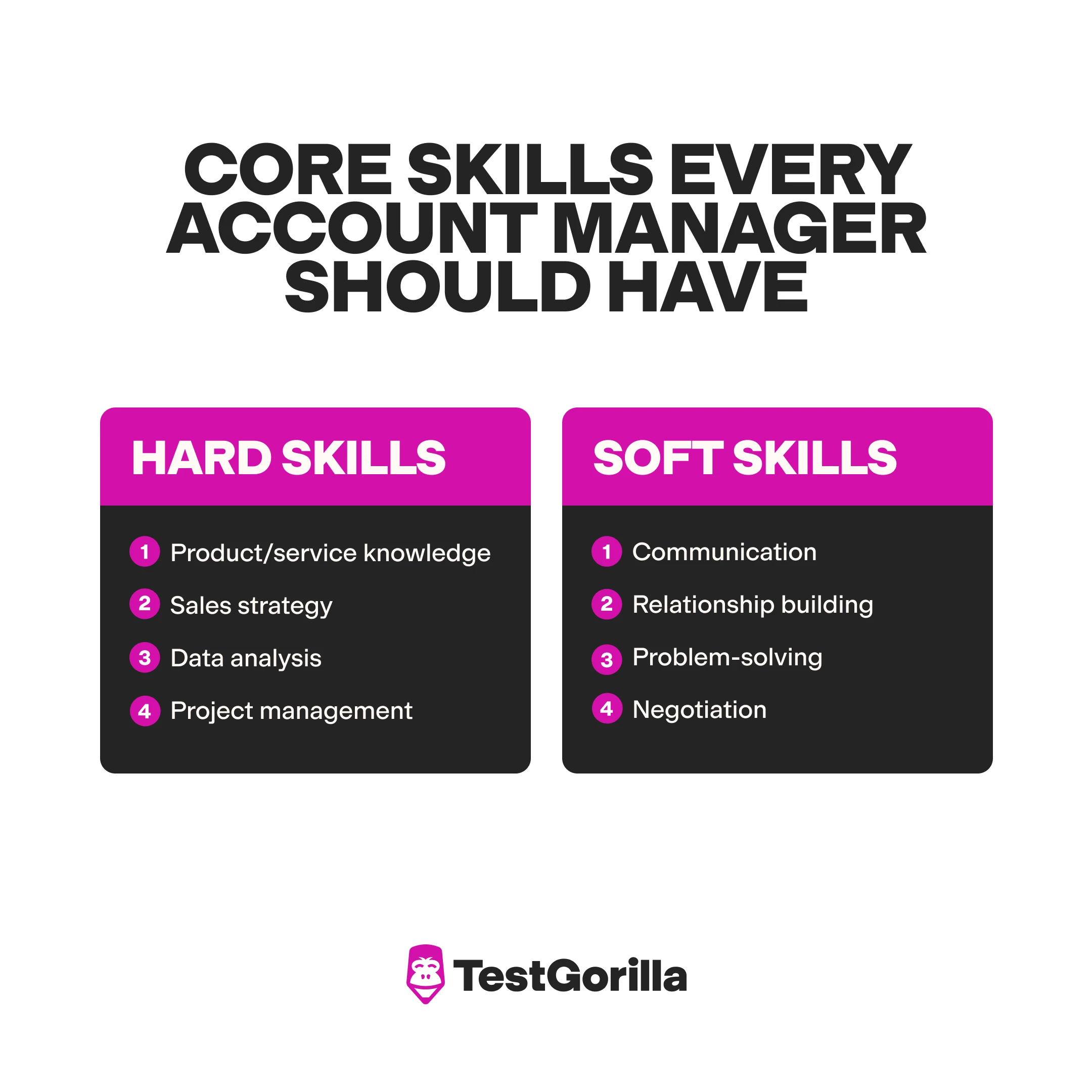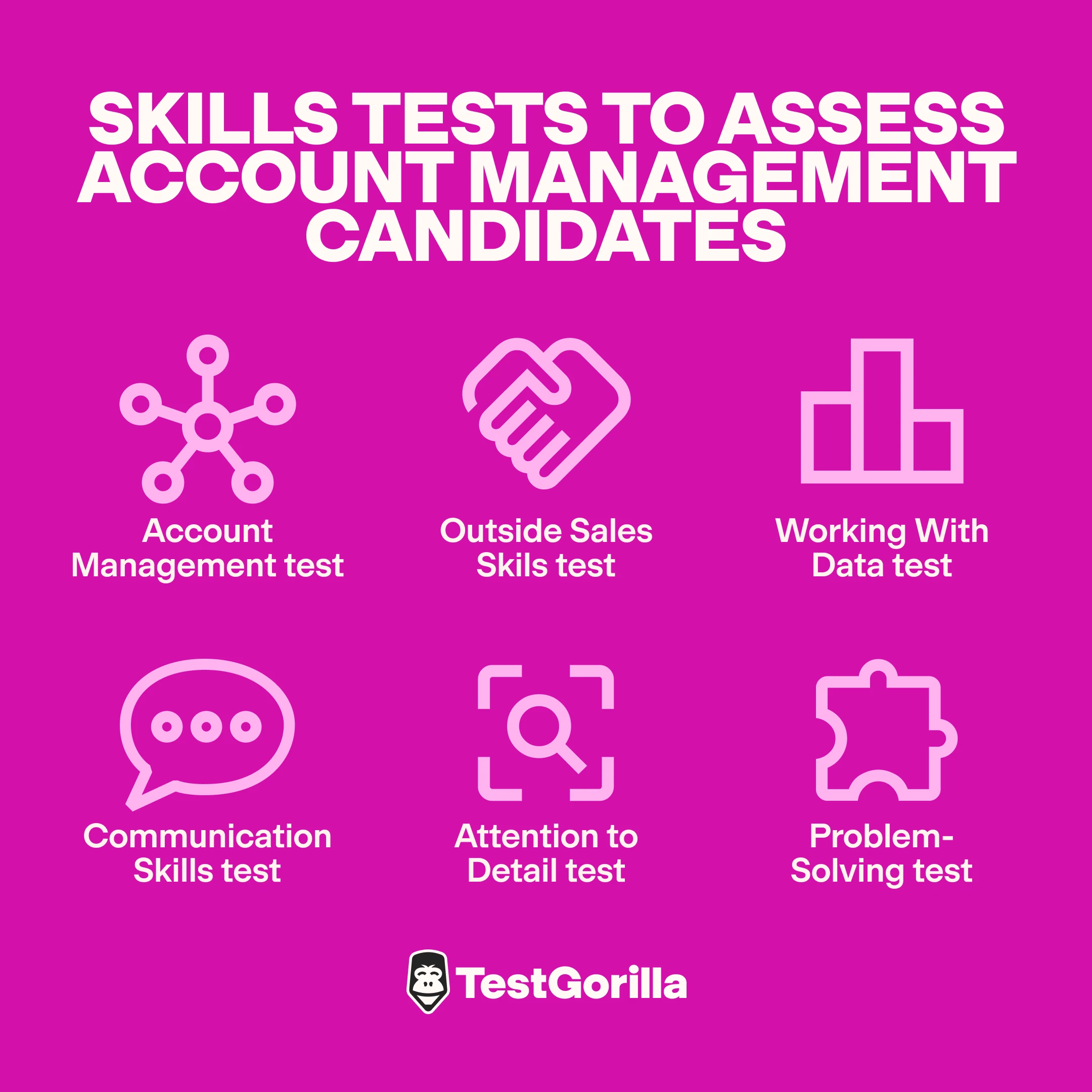On the hunt for a strong account manager? Well, you’ve got your hands full. Account managers do so much for your clients and your internal team. Their task list is enormous, and they need the right skills to balance their everyday to-dos.
If you don't find a candidate with strong account manager skills, you risk losing clients and harming your brand’s reputation – and your revenue growth could take a hit.
Rest assured, we’re here to help you avoid that! Our guide breaks down eight essential skills to look for in an account manager, explains how these skills contribute to success, and dishes the details on how to assess your candidates.
What is an account manager?
An account manager is your go-to person between your company and its clients. They make sure every client gets exactly what they need – from products to services.
Here’s their daily grind:
They're always chatting with clients, figuring out what they need, solving any problems, and keeping them in the loop.
They manage schedules, answer emails, and send out updates on how things are going.
They keep relationships strong by staying in touch and finding solutions to fit each client’s goals.
They spot opportunities to suggest more or different services that could boost the client’s business.
When issues pop up – like a hitch in service delivery or a contract snag – they dive into the details, find a fix, and smooth things over to keep the relationship on track.
They collaborate with teams across the company – like sales, marketing, and customer service – to make sure everything runs like clockwork. This “everything” includes finishing projects, meeting deadlines, and fulfilling client expectations.
In a nutshell, account managers keep clients smiling and drive your business forward. They're a key part of your team, helping build your brand’s rep and fueling growth.
Core skills every account manager must have
Here are the eight key skills that every talented account manager should have.
Hard skills and expertise
Product/service knowledge: An account manager must know your company’s products or services like the back of their hand. This way, they can answer client questions, highlight the perks of your product or service, and recommend the right solutions that really fit the client’s needs.
Sales strategy: Account managers are master salespeople. They’ve got to predict what their clients will need next, offer advice like a pro to secure repeat business, and craft sales pitches that actually help solve problems. This includes finding opportunities for upselling and cross-selling additional products or services.
Data analysis: Diving into client data – like how the client is performing and what the market is doing – is just part of the job. This data enables account managers to make smart choices, understand their clients’ needs, and suggest strategies that bring in real results.
Project management: Managing the delivery of products or services, keeping teams in sync, and hitting deadlines to meet client expectations is crucial. Strong project management skills mean account managers can juggle different priorities, dodge setbacks, and keep clients happy.
You may also like: Need to hire an account manager? Check out this Account Manager job description template and get the ball rolling on your hiring process.
Soft skills
Communication: Account managers need to get messages across clearly, handle concerns swiftly, and set realistic expectations. This makes clients feel valued and cuts down on mix-ups while keeping internal teams happy with the work.
Relationship building: Solid relationship skills build trust and connection, convincing clients to stick around for the long haul. By keeping these relationships strong, account managers boost repeat business, increase revenue, and keep a solid client roster.
Problem-solving: Account managers have to tackle problems fast – whether those problems concern how services are delivered, how products are performing, or the details of a contract. Being a sharp problem-solver means quickly getting to the heart of an issue, finding the right fix, and taking action to stay on good terms.
Negotiation: Account managers often find themselves hashing out the details of contracts, pricing, or product/service terms with clients. Being skilled in negotiation helps clinch deals that work well for everyone, balancing client happiness with the company's needs.
The role of an account manager blends sales and business development. For detailed tips on evaluating these skills, check out our guides on how to assess business development skills and how to assess sales manager skills.
The best insights on HR and recruitment, delivered to your inbox.
Biweekly updates. No spam. Unsubscribe any time.
How to assess account manager candidates
If you're looking for real proof that your account manager has the skills to handle your client relationships, resumes won't give you much. They mostly focus on a candidate's self-presentation of their abilities. Some candidates really know how to talk themselves up, while others don’t have the “right” degree or experience to showcase the skills they really have.
Resumes also introduce bias into your hiring process. For example, you might pick a candidate just because they managed a cool account – but they might not actually have the skills you need.
That’s why talent discovery platforms like TestGorilla are great. We offer “400+” of tests covering technical skills, personality traits, and cognitive abilities. This way, you can get a 360-degree view of a candidate’s potential and move past resumes for fair, data-driven hiring decisions.
With TestGorilla, you can combine up to five tests to create a comprehensive talent assessment for your account manager position – and add custom questions to make it unique to your role.
Here's how to assess candidates for account management roles:
Assess candidates' hard skills
With our Account Management test, you can identify candidates who can boost your revenue while building strategic, lasting relationships with clients.
The Outside Sales (B2B) Skills test evaluates a candidate’s ability to find and manage leads and address clients’ concerns.
Our Working With Data test assesses candidates’ ability to handle data correctly and perform basic data analysis. These skills are necessary for analyzing client data.
Assess soft skills next
Our Communication Skills test checks a candidate’s ability to relay information clearly, as they’ll need to do this to keep clients and internal teams on the same page.
The Attention to Detail test finds candidates that don’t miss textual details when processing a lot of information. It checks how “alert” they are to the little things that can have big impacts on client satisfaction and business outcomes.
Our Problem-Solving test checks how candidates handle challenges and find solutions. This can clue you into how they’ll handle client-related problems.
You can also use personality tests like Enneagram, 16 Personalities, or DISC to learn more about your account manager candidates’ adaptability, relationship-building, and motivation.
Don’t forget about culture add
According to James McDonough, Enterprise Account Director at FluidOne:
“[Account managers] embody the values and culture of the business, which can build trust with the customer. It prevents [customers] from viewing the company as a cold, corporate structure and instead as a group of helpful people who want to support their success.”
Since account managers are the client-facing reps of your business, they need to line up with your values and company culture. But they shouldn’t just think like everyone else at the company – they should be able to think outside the box to address client challenges, improve products or services, and secure long-term business.
Try our Culture Add test to see how your candidate's values line with your organization's and identify behaviors that could make them a good influence on your company culture.
Top it off with interviews
Interviews take you deeper into candidates' experiences and help you understand how they handle real-world client situations. This can also be a great opportunity to learn more about the skills your earlier tests didn’t touch on.
Ask behavioral questions like:
“Describe a situation where you had to coordinate with multiple internal teams to deliver a service or product to a client. How did you manage the process, and how did the client respond?" Their answer will shed light on their coordination skills and ability to manage client expectations.
"Tell me about a situation where you identified an opportunity to upsell or cross-sell to a client. How did you approach it, and what was the result?" This assesses their sales strategy skills and ability to drive growth.
Pro tip: Does your candidate have no direct experience but show potential? Then ask them situational questions instead, like “Imagine a situation where you had to coordinate with multiple teams…”
2 mistakes to avoid when assessing candidates
Here are two missteps to dodge when sizing up candidates for account manager roles.
1. Ignoring if they can balance multiple clients
Sure, a candidate might be awesome with one type of client, but what about handling different kinds all at once? Missing out on evaluating their ability to manage several clients and projects at the same time could lead to a bunch of unhappy customers.
Always check if they can handle different personalities, meet varied needs, hit multiple deadlines, and achieve different goals across several accounts.
2. Not probing whether they can find middle-ground solutions
Imagine this: Your client wants a new feature ASAP, but your internal team is swamped with other projects. Can your account manager bridge the gap and find a solution that satisfies both sides?
When assessing candidates, dig into their approach to finding compromise between internal teams and clients. Without doing this, you might end up with an account manager who struggles to keep the peace – leaving clients or your team feeling ignored or frustrated.
FAQs
Here are some frequently asked questions about the account management role.
Is account manager a high-up role?
An account manager has a mid-level role in an organization. They manage client relationships, coordinate internal teams, and help out with business growth. Their position might not be an executive position, but they play a big role in growing the client base.
What is an account manager’s average salary in the US?
According to Indeed, the average base salary for an account manager in the US in 2024 is $69,684.00. But depending on how well they're doing, some could pull in close to $130,000, while others might get around $37,000. They also earn an average of $18,000 each year in commission.
Keep your client relationships thriving with TestGorilla
All-star account managers are the faces of your business. So, betting big on a candidate because of an impressive resume is not a great decision. You need concrete data showing your candidate can keep your client relationships in steady hands. Our talent assessments, backed by science and subject-matter experts, are the best way to do this. Choose from a wide range of tests to evaluate your candidates' practical skills, traits, and cognitive abilities. This way, you can hire an account manager who meets all your business and client needs.
Try it out for yourself. Check out our library of “400+” tests, book a live demo with a member of our team, or create a free TestGorilla account today!
You've scrolled this far
Why not try TestGorilla for free, and see what happens when you put skills first.
















